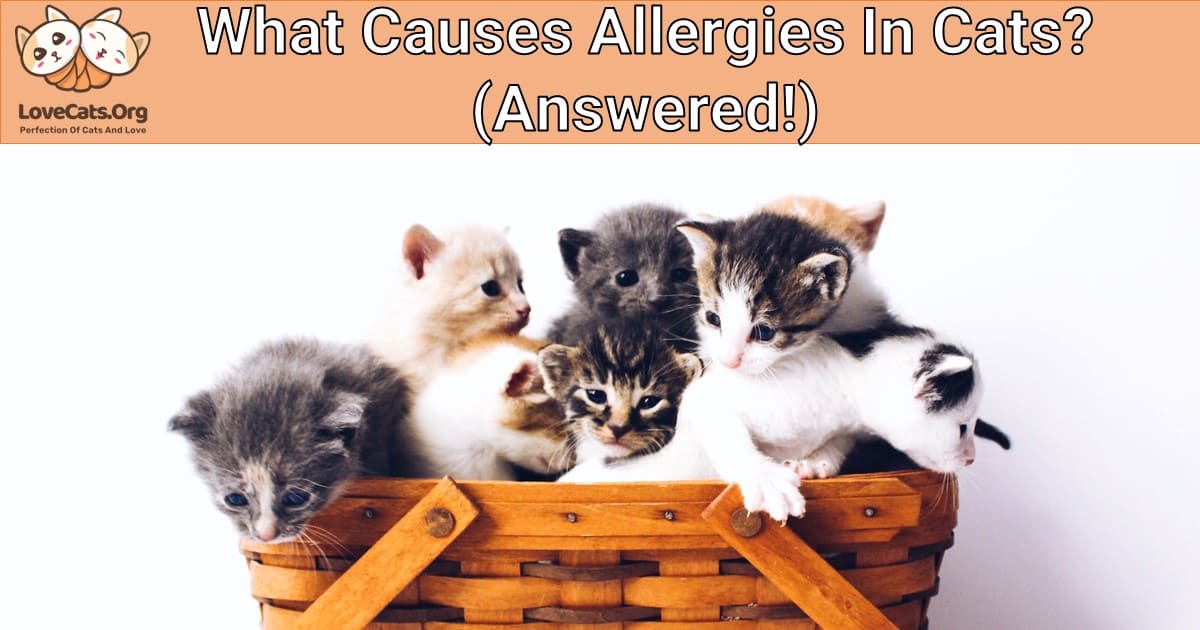Various things, including environmental factors such as dust mites and pollen, can cause cat allergies.
Food ingredients like dairy products or wheat gluten.
Flea bites from parasites that live on the skin.
Certain medications are used to treat other conditions.
I believe allergies are among the most common health issues affecting cats today.
They cause discomfort for our furry friends and can lead to serious medical problems if left untreated.
Some signs of your cat’s allergy include excessive scratching, licking their fur excessively, sneezing/coughing fits, or vomiting after eating certain foods.
It’s essential to identify what is causing these reactions so you can take steps toward treating them properly!
Symptoms Of Allergies In Cats
Cats can suffer from allergies just like humans.
Symptoms of allergies in cats include sneezing, coughing, wheezing, and difficulty breathing.
Itchy skin or fur loss due to excessive scratching.
Redness around the eyes and nose area.
Runny eyes or nasal discharge that is clear to yellowish-green in color.
Other signs may be vomiting, diarrhea, increased drinking/urination frequency, and changes in behavior such as lethargy or aggression.
Allergies are caused by environmental factors such as pollen grains found outdoors (seasonal), dust mites indoors (year-round), and certain foods they eat, which could trigger an allergic reaction if their immune system overreacts when exposed to these allergens.
Pet owners need to recognize symptoms early so proper treatment can begin immediately!
How To Treat Allergies In Cats
Cats can suffer from allergies just like humans.
To treat your cat’s allergy, it is essential to identify the cause and then take steps to reduce or eliminate exposure:
- Identify what type of allergen may be causing the reaction (e.g., pollen, dust mites).
- Reduce contact with allergens by keeping windows closed during high-pollen times.
- Using air filters in rooms where cats spend time.
- Washing bedding regularly.
- Vacuuming often and changing litter frequently.
- Consider switching food brands if you suspect a dietary sensitivity – look for hypoallergenic options free from common irritants such as wheat gluten, cornstarch, or soy protein isolate.
- Speak to your vet about antihistamines which could help relieve symptoms such as sneezing and itching skin but should only be used under veterinary supervision. That’s due to potential side effects on other organs, including liver damage. So regular blood tests will need monitoring when taking these medications long term.
- If necessary, use topical treatments prescribed by vets, e.g., steroid creams/ointments applied directly onto affected areas of skin twice daily until the condition improves. That helps control inflammation associated with allergic reactions quickly without having systemic effects throughout the body, unlike oral medication taken internally via the mouth route.
In Summary: What Causes Allergies In Cats?
Various things, including environmental allergens such as pollen and dust mites, can cause cat allergies.
Food allergies from certain ingredients like dairy or wheat.
Flea bites cause an allergic reaction to the saliva left behind on their skin.
Contact with other animals who may have dander or fur particles they are sensitive to.
Cat owners must pay attention to any signs of discomfort their pet might show to identify what could trigger an allergy attack.
It’s also essential for them to take preventive measures against potential triggers
it includes regular grooming sessions, keeping up-to-date with vaccinations and parasite control treatments (such as flea prevention), avoiding foods known to contain familiar allergen sources (like grains) when feeding your cat at home,
All these steps will help ensure your feline friend stays healthy!


